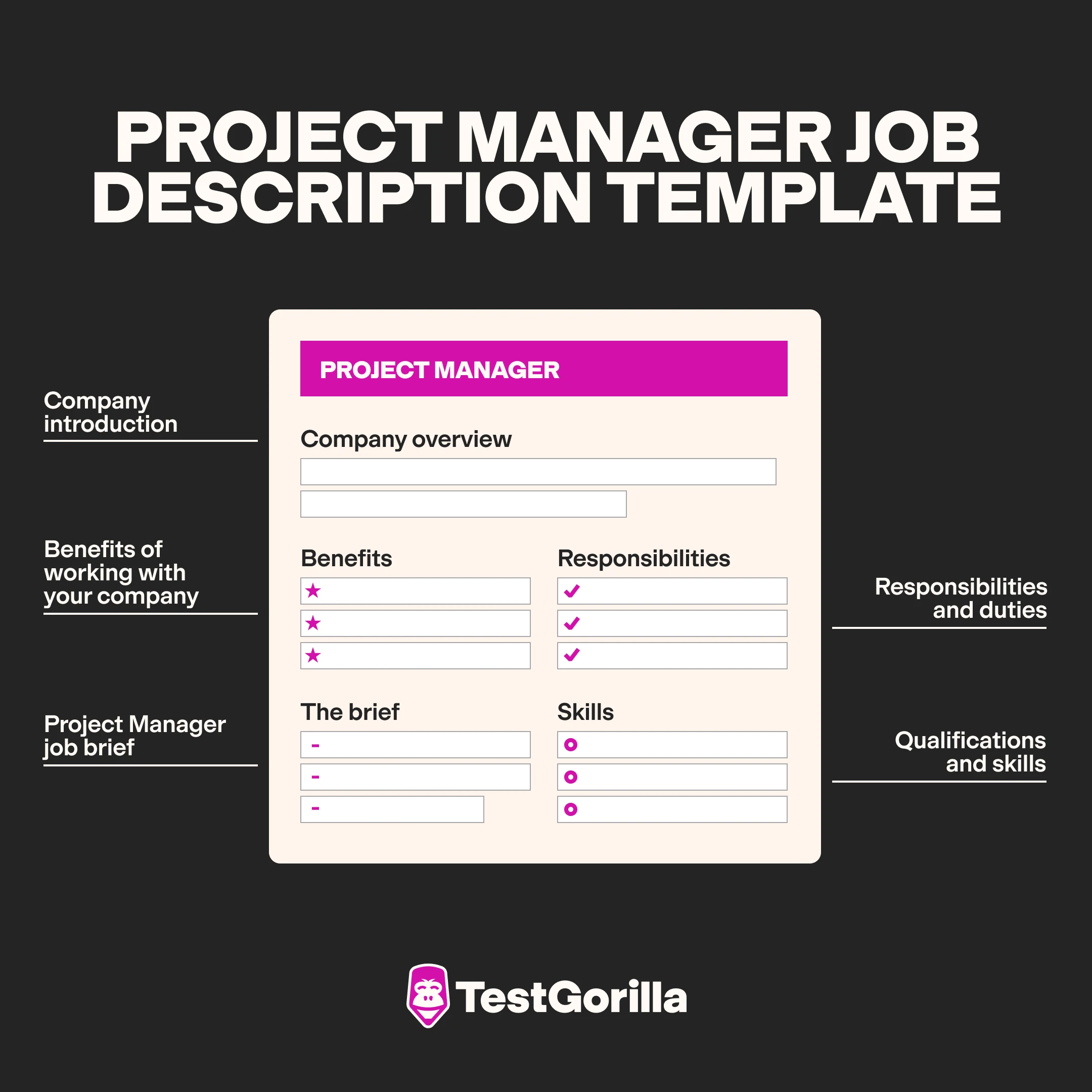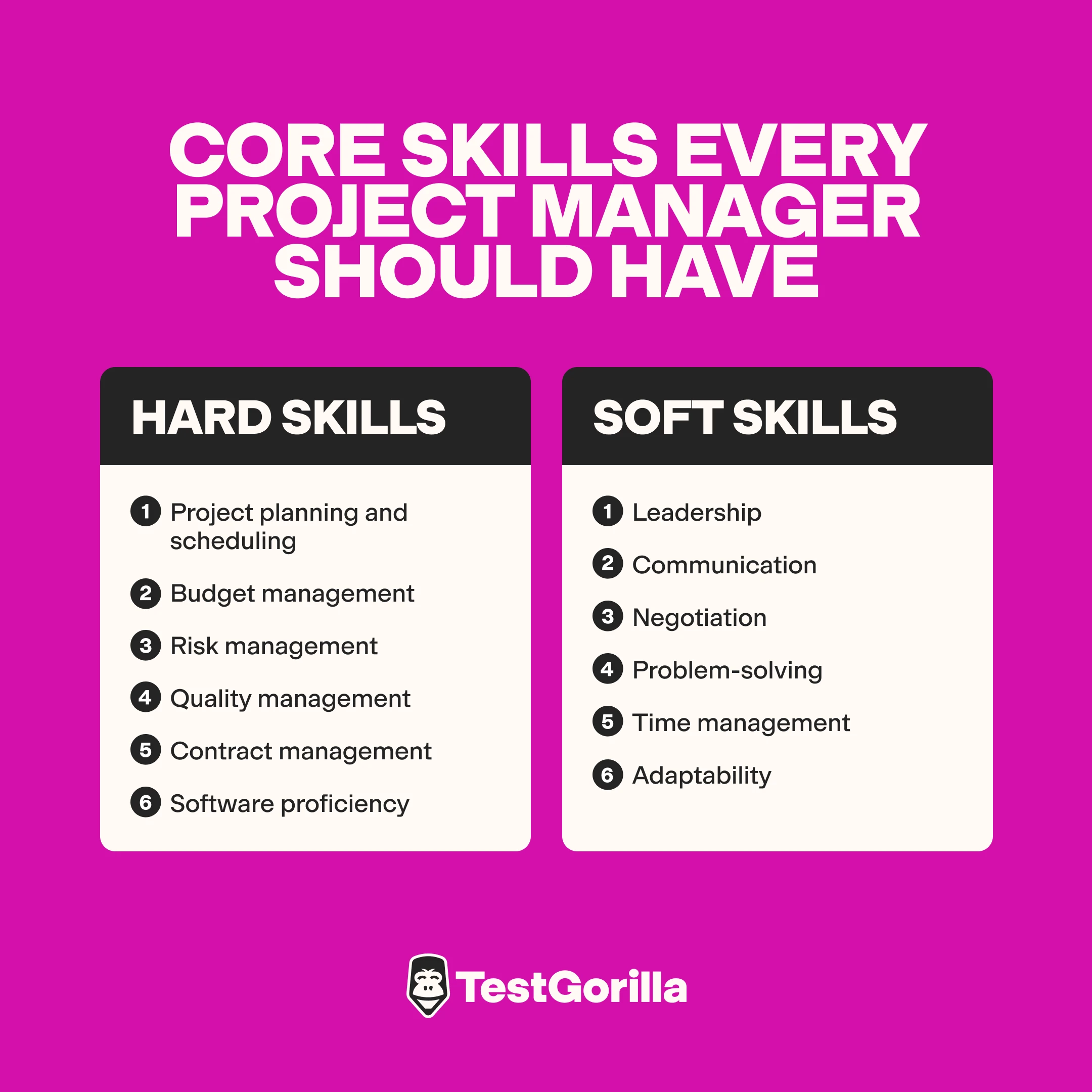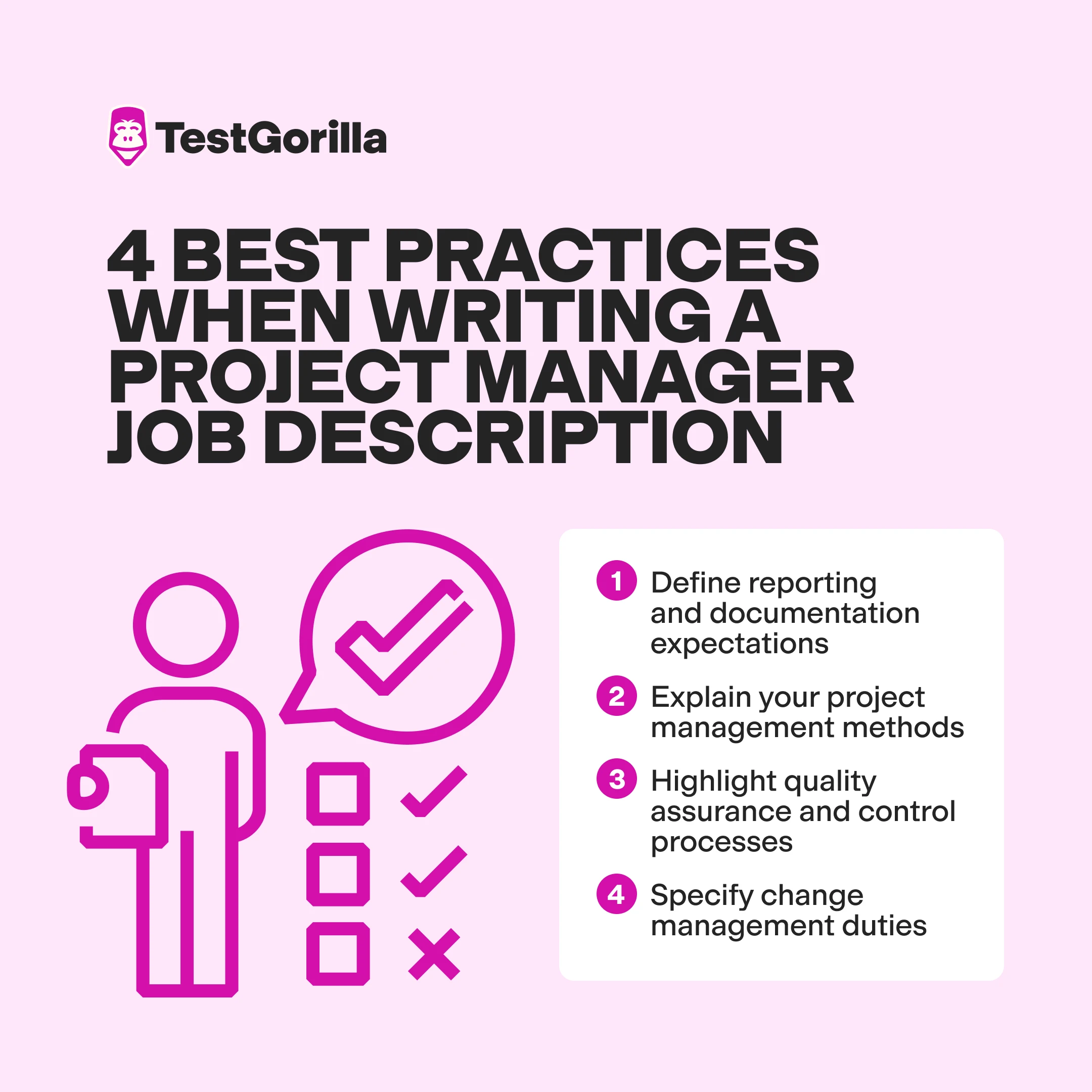Project Manager job description template
Company Introduction
[Company Name] is a dynamic and innovative organization that thrives on collaboration and creativity. Our company culture fosters a supportive and inclusive environment where every team member is valued and encouraged to reach their full potential. We pride ourselves on our forward-thinking approach and commitment to excellence, making [Company Name] a fantastic place to grow your career.
Benefits of Working with [Company Name]
Joining [Company Name] means becoming part of a passionate and driven team. We offer a range of perks, including [e.g., flexible working hours, opportunities for professional development, and a comprehensive benefits package]. Our employees enjoy [e.g., a healthy work-life balance, regular team-building activities, and the chance to work on exciting projects that make a real impact].
[ROLE] Job Brief
As a Project Manager at [Company Name], you will play a crucial role in driving the successful delivery of projects from inception to completion. You will work closely with cross-functional teams, manage project timelines, and ensure all project objectives are met. Your expertise in project management will be essential in helping us achieve our strategic goals.
[Company Name]
Job Title: [ ]
Reports to: [ ]
Position Type: [For example, full-time or part-time]
Location: [Remote, hybrid, on-site, address, etc.]
Salary and Benefits: [Salary and benefits details]
Responsibilities and Duties
Lead project planning sessions and manage project timelines.
Coordinate internal resources and third parties/vendors for the flawless execution of projects.
Ensure all projects are delivered on time, within the scope, and within budget.
Develop detailed project plans to monitor and track progress.
Manage changes to the project scope, schedule, and costs using appropriate verification techniques.
Measure project performance using appropriate tools and techniques.
Report and escalate to management as needed.
Perform risk management to minimize project risks.
Establish and maintain relationships with third parties/vendors.
Create and maintain comprehensive project documentation.
Skills and Qualifications
Required Skills and Experience
Proven experience as a Project Manager.
Excellent client-facing and internal communication skills.
Strong organizational skills including attention to detail and multitasking skills.
Solid technical background with understanding and/or hands-on experience in software development and web technologies.
Proficiency in project management software tools.
Preferred Skills and Experience
Project Management Professional (PMP) certification.
Experience in Agile/Scrum methodologies.
Advanced degree in a related field.
Experience managing projects in a similar industry.
[Company Name] is an equal-opportunity employer. We celebrate diversity and are committed to creating an inclusive environment for all employees. We look forward to welcoming you to our team!
Want to know more? Read this article: Project manager job description template: Everything you need to include
Table of contents
- What is a project manager?
- Key skills to look for in project managers
- How to write an effective project manager job description
- 2 things to avoid when writing a job description for project managers
- Next steps: Attracting and assessing project manager candidates
- FAQs
- Land the perfect project manager with TestGorilla
What is a project manager?
A project manager makes sure a project runs smoothly from start to finish. They handle planning, monitor deadlines, and manage resources.
For example, say a company is launching a new app. A project manager will coordinate with developers, designers, and marketing teams to keep everyone on track. They will create detailed project plans, assign tasks, set milestones, and manage the budget, too.
Project managers are also the go-to for solving problems, keeping everyone updated, and ensuring tasks get done on time. Plus, they identify and tackle any risks to guarantee the final product meets high-quality standards.
Key skills to look for in project managers
Here are the hard and soft skills that a grade-A project manager should have:
Hard skills
Project planning and scheduling: Using tools like Microsoft Project or Primavera to create detailed project plans, set timelines, and manage resources effectively.
Budget management: Handling project budgets, tracking expenses, and ensuring the project stays within financial limits.
Risk management: Spotting potential risks, developing strategies to deal with them, and implementing risk management plans.
Quality management: Setting up and following strict procedures to make sure project deliverables meet the required standards and quality benchmarks.
Contract management: Understanding contract negotiations, procurement processes, and managing vendor relationships.
Software proficiency: Being skilled in project management software like Asana, Trello, or Jira to track progress, assign tasks, and collaborate with team members.
Soft skills
Leadership: Inspiring and motivating the team, delegating tasks well, and leading by example to hit project goals.
Communication: Clearly explaining project goals, updates, and expectations to everyone involved.
Negotiation: Finding common ground with stakeholders, vendors, and team members to make agreements and resolve conflicts.
Problem-solving: Quickly figuring out issues, thinking of solutions, and putting them into action effectively.
Time management: Prioritizing tasks, managing deadlines, and keeping the project moving forward.
Adaptability: Being flexible enough to change plans and strategies when project requirements shift or unexpected challenges pop up.
The best insights on HR and recruitment, delivered to your inbox.
Biweekly updates. No spam. Unsubscribe any time.
How to write an effective project manager job description
Stick to these four best practices when writing your project manager job description:
1. Define reporting and documentation expectations
Be specific about the types of reports (such as status updates and budget summaries) and the documentation standards that your project manager should follow.
Example: “You’ll need to prepare weekly status updates, detailed project plans, and final project documentation. Experience with tools like MS Project and Confluence is important for this role.”
2. Explain your project management methods
Be clear about which project management methods you use and what certifications, if any, candidates need to succeed in the role.
Example: “We need a project manager who knows their way around different project management methods like Agile, Scrum, and Waterfall. It’s a big plus if you have certifications like PMP, PRINCE2, or CSM. You’ll be using these methods to keep our projects on track and running smoothly.”
3. Highlight quality assurance and control processes
Clearly explain how the project manager will make sure project deliverables meet quality standards. Also, describe the quality assurance and control processes they’ll implement and monitor.
Example: “You’ll be responsible for setting up quality assurance processes to make sure deliverables meet our standards. This includes conducting quality audits and creating corrective action plans when needed.”
4. Specify change management duties
Finally, describe how the project manager will handle changes to the project scope, timeline, and resources. Highlight the need for creating change management plans and keeping the team and stakeholders informed, too.
Example: “You’ll develop plans to manage project changes and make sure everyone is kept in the loop. Experience with handling change requests and adjusting project plans is a must.”
2 things to avoid when writing a job description for project managers
When writing a job description for a project manager, you’ll want to avoid a couple of common mistakes:
1. Overlooking stakeholder management skills
Don’t forget how important it is for a project manager to handle relationships with stakeholders, including senior management and clients.
Try writing something like this: “You’ll manage stakeholder relationships by providing regular updates, holding meetings, and addressing any concerns to ensure everyone is aligned and satisfied with the project’s progress.”
2. Forgetting cross-functional team leadership
Project managers often work with different teams across various functions. Instead of vague statements about teamwork, be clear about leading diverse teams.
For instance, don’t just say you’re looking for a candidate who “works well with teams.” Opt for something like, “You’ll lead cross-functional teams, including developers, designers, and marketers, to ensure smooth project execution and unified project goals.”
Next steps: Attracting and assessing project manager candidates
Now that your project manager job description is fresh out of the oven, it’s time to put it to good use. Find creative places to publish it online, whether in a community like r/ProjectManagement on Reddit or TestGorilla’s job board for remote roles.
Of course, a great job description can snag candidates but won’t get you far if you don’t know how to assess them. That’s where TestGorilla’s talent assessment platform comes in. We use a skills-based hiring approach that moves away from the paper-thin resume-scanning process. Instead, we focus on the actual skills and abilities candidates bring to the table. With our library of 350+ science-backed skills tests, you can discover candidates with the perfect skills for your unique project manager role. You can combine up to five tests to build your own custom assessment.
Try these tests on for size:
Pro tip: Pair these tests with our Culture Add and Enneagram personality test to see how well each candidate meshes with your company culture and complements your existing team dynamics.
FAQs
Here are some common questions about project managers:
How can I assess project management experience during an interview?
Ask candidates about projects they’ve worked on to get a good sense of their project management experience. Focus on specific situations where they had to solve problems, lead a team, or manage a tricky situation. These stories can give you a clear picture of their planning, problem-solving, and leadership skills. For inspiration, check out these 69 project manager interview questions.
What educational background is typically required for a project manager?
While many project manager roles require a bachelor’s degree in business, engineering, or IT, having a degree isn’t the only path to success in this field. What really matters is a candidate’s ability to manage projects effectively. Don’t let a lack of a degree stop you from evaluating a candidate’s true abilities.
Land the perfect project manager with TestGorilla
Attracting skilled project manager candidates starts with a detailed job description. You need to put skills and qualifications front and center, and don’t worry so much about shiny resumes or degrees. When applications start coming through the door, it’s time to assess each candidate with a suite of accurate, unbiased tests. Luckily, TestGorilla’s library of more than 400 pre-employment tests pinpoints promising candidates instantly, with comparable results your whole team can chime in on.
Want to upgrade your hiring process? Give TestGorilla a try! You can start by requesting a free live demo or signing up for our free plan today.
You've scrolled this far
Why not try TestGorilla for free, and see what happens when you put skills first.





















